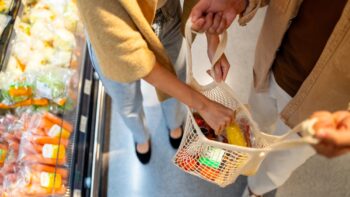Staying Healthy and Saving Money While on Food Stamps
Food stamps are offered through the Supplemental Nutrition Assistance Program (SNAP) as benefits to individuals and families with low household incomes, and who require assistance in making monthly food purchases. While many food stamp recipients may feel that this period of financial crisis requires an exclusive focus on cutting costs and saving money, individual and family health should not be neglected, and it can and should still remain a priority. The key strategy is to use the benefits on those items that will provide sufficient nutritional support and will contribute to two or more meals. By supplementing groceries with fresh produce from farmers’ markets, many who accept the SNAP benefits can also assist in staying fit while on SNAP. Strategic meal planning allows beneficiaries of SNAP to maintain a healthy balanced diet, even while on food stamps.
What to Buy With Food Stamps
Food stamps can be used to purchase products from the basic food groups of produce, dairy, grains and protein. They can also be used for baby food, and seeds or plants to grow food at home. The food stamp program does not exclude the purchase of junk food items, such as cookies and chips, or luxury food items, such as steak or lobster. Food stamps cannot be used, however, to purchase tobacco products or alcohol, hot foods or drinks, food intended to be consumed on site, vitamins and supplements, pet food, or other nonfood items like paper products or cosmetics.
The variety permitted by the food stamps program means that any two people receiving SNAP benefits could choose to spend their monthly allowance in vastly different ways and live off entirely distinct diets. Junk foods may seem like the simpler, less expensive and less perishable food option to buy when forming a grocery list. However, it is possible to create balanced meals on a budget for a healthy diet while receiving food stamps.
Access to Healthy Foods
Recent 2016 federal legislation mandated that retailers that accept food stamps must offer a larger selection of fresh and healthy food options. Previously, they were only required to offer three varieties of food in each United States Department of Agriculture (USDA) food group. The new legislation expands the previous requirements to seven varieties in each food group, and three types of each variety. This means that wherever beneficiaries are shopping at with their food stamps, a wider variety of types of food should be available to build healthy and balanced meals.
Planning Healthy Meals on a Budget
Eating healthy is possible on a budget, even on food stamps. However, this does require some proper planning in advance. Creating a meal plan and subsequent grocery list ensures that you receive the health benefits and nutrients from each food group, and can create balanced meals. Making a shopping list also helps to avoid impulse buys in the store and gives an opportunity to take stock of what is already at home. It also allows you to effectively use pantry items and leftovers.
When planning a shopping list, remember to check the local newspaper and advertisement flyers for coupons. Only use them on necessary items, however, because saving money on products not originally in the budget is not actually saving money. Take time to compare costs while in the store, not only between brands, but also between preparation types. That is, buy fresh produce when it is in season, but if a meal requires corn during the winter, for example, consider whether canned or frozen is a cheaper option. Also consider whether bakery items, prepped and marinated meats, or prepped and seasoned vegetables can be prepared from scratch for a lower cost. When shopping for healthy foods, moreover, it is important to compare nutrition labels. Look for foods that are lower in fats, sugar, sodium and cholesterol, and higher in protein, fiber, vitamins and minerals.
Tips for Shopping Each Food Group
When looking at bread and grains, ask the bakery if it has any deals on day-old bread. Additionally, buy bulk packages of regular grains, like rice and oatmeal, instead of the instant flavored varieties. These are usually cheaper in the long run, and allow for more preparation options.
Fruits and vegetables are almost always cheaper when they are in season. Buy big bags of frozen produce when possible, as these are less expensive options that can keep for a while in the freezer. If only a small amount of produce is needed, consider shopping at the salad bar in the grocery store. While these products tend to be more expensive by weight, it can save you money on food that might otherwise go to waste when bought in larger quantities.
Consider buying nonfat dry milk, which is the least expensive way to purchase dairy. Mix it several hours before its intended use, so that it can be chilled in the fridge. When buying fresh milk, larger containers, like gallons, are usually less expensive per unit than small containers, like quarts. Remember to purchase only what can be consumed before it will go to waste.
Shopping for meat on sale can save a lot of money. Additionally, look for cheaper cuts of meat, such as bottom rounds, that may require longer cooking times but are healthier because they contain less fat. Moreover, consider buying whole chickens if they are within the budget, and cut them into pieces at home. Freeze the chicken pieces in meal size packages, and prepare them when needed for a meal.



